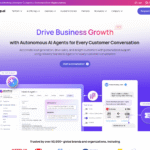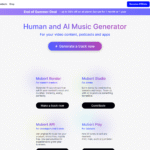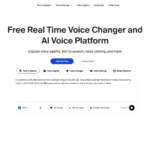Notion AI transforms smart note taking. Boost efficiency, save time, and learn smarter in learning and education. Ready to upgrade your workflow? Try Notion AI!
Using Notion AI to Boost Your Smart Note Taking Efficiency
Alright, let’s talk turkey.
The world’s getting faster.
More info than ever.
Especially if you’re neck-deep in learning or education.
Students drowning in lectures.
Teachers swamped with research.
Professionals trying to skill up while juggling everything else.
Notes become a nightmare.
Pages and pages.
Highlights everywhere.
But can you find what you need, when you need it?
Probably not.
Enter AI.
It’s not just for writing sales copy or making pretty pictures anymore.
It’s changing how we process information.
How we learn.
How we *take notes*.
Specifically, *smart* note taking.
Going beyond just scribbling stuff down.
Making notes work for you.
Making them searchable.
Summarizable.
Actionable.
And Notion AI is leading the charge here.
It’s not just a note-taking app anymore.
It’s a full workspace.
And now, it’s got brains.
Adding AI capabilities directly into your workflow.
Especially for anyone focused on learning and education.
Thinking students, researchers, tutors, content creators in the educational space.
If you deal with information overload daily, listen up.
This isn’t just a cool gadget.
It’s a tool that can genuinely free up your time.
Improve your understanding.
And make those mountains of notes manageable.
Let’s see how Notion AI is shaking things up for smart note taking.
Table of Contents
- What is Notion AI?
- Key Features of Notion AI for Smart Note Taking
- Benefits of Using Notion AI for Learning and Education
- Pricing & Plans
- Hands-On Experience / Use Cases
- Who Should Use Notion AI?
- How to Make Money Using Notion AI
- Limitations and Considerations
- Final Thoughts
- Frequently Asked Questions
What is Notion AI?
Okay, first things first.
What exactly *is* Notion AI?
Think of Notion.
It’s already a super flexible workspace.
Databases, notes, wikis, project management.
All in one place.
Notion AI is the AI layer built directly into it.
It’s not a separate app.
It lives *inside* your Notion pages.
This means it can interact with your existing content.
The notes you’ve already taken.
The documents you’ve saved.
The databases you’ve built.
Its core function?
To help you work with text more efficiently.
Write stuff.
Summarize stuff.
Organize stuff.
Brainstorm stuff.
It’s designed for anyone who deals with a lot of information and needs to make sense of it quickly.
Students, yes.
Researchers, absolutely.
But also writers, marketers, project managers, anyone who uses Notion to keep their life or work in order.
For learning and education, this is massive.
It takes the manual grind out of processing educational content.
Reading articles.
Watching lectures.
Compiling research notes.
Instead of just storing info, you can now process it on the fly.
Turn rambling meeting notes into key takeaways.
Condense a long research paper into bullet points.
Draft study questions from lecture notes.
It’s like having a research assistant who lives inside your note-taking app.
Always available.
Works instantly.
Doesn’t complain.
Notion AI is integrated right where your notes are.
That’s the key.
It understands the context of your workspace.
It’s not just a generic AI writing tool.
It’s an AI tool designed to augment *your* notes, *your* documents, *your* knowledge base within Notion.
This makes it incredibly powerful for smart note taking.
Because your notes aren’t just static text.
They become dynamic, searchable, and transformable assets.
Ready to be processed and understood deeper.
That’s the foundation.
An AI engine running inside your personal or team workspace.
Focused on making text work faster and smarter for you.
Especially crucial in learning and education.
Key Features of Notion AI for Smart Note Taking
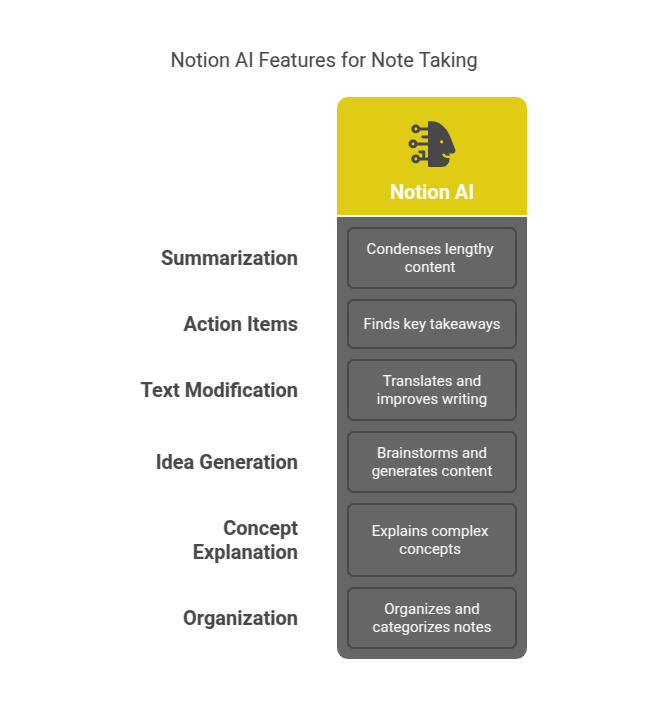
Alright, let’s get into the brass tacks.
How does Notion AI actually *help* with smart note taking?
What can it do?
- Summarize Lengthy Content:
This is huge.
Got a lecture transcript?
A long research paper?
Meeting notes that ramble on forever?
Notion AI can condense it down.
Ask it to “Summarize this” or “Give me the key points.”
It reads the content in your Notion block or page.
Pulls out the core ideas.
Delivers them in a concise format.
Saves you ages wading through text.
Perfect for reviewing material quickly before an exam.
Or getting the gist of an article without reading every single word.
This feature alone makes your notes way more accessible and useful for revision.
- Find Action Items & Key Takeaways:
Ever leave a meeting or finish a study session and think, “Okay, what do I actually NEED to do?”
Notion AI can scan your notes for that.
Prompt it to “Find action items” or “Extract key takeaways.”
It sifts through the text.
Identifies tasks, decisions, or crucial points discussed.
Presents them in a clear list.
This transforms passive notes into an active to-do list.
Turns lecture notes into study tasks.
Makes sure you don’t miss important follow-ups from collaborative sessions.
It’s moving from simply recording information to processing it for action.
- Translate, Improve Writing, & Fix Grammar:
Your notes don’t have to be perfect drafts.
But sometimes you need to polish them.
Or understand notes taken in another language.
Notion AI offers options to “Improve writing,” “Fix grammar and spelling,” or “Translate.”
Scribble down ideas quickly during a lecture.
Then use AI to clean them up later.
Translate research notes from a foreign source.
Ensure your study guides are clearly written and easy to understand.
It takes the effort out of making your notes presentable or usable in different contexts.
Especially handy if you collaborate or share notes.
- Brainstorm Ideas & Generate Content:
Stuck on an essay topic?
Need ideas for a presentation?
Notion AI can help brainstorm.
Tell it your topic and ask for ideas.
“Brainstorm essay topics on the impact of AI in education.”
It can also generate initial drafts or outlines.
“Write an outline for a chapter on medieval history based on these notes.”
While not generating notes itself (usually), it helps you use your notes to generate *new* content or structure your thinking.
This moves beyond just capturing info to actively using it for creation.
Great for students starting assignments or educators planning lessons.
- Explain Complex Concepts:
Read something in your notes that you didn’t quite grasp?
Highlight it and ask Notion AI to “Explain this.”
It can simplify jargon or break down complex ideas based on the surrounding text (or its general knowledge).
This is like having a built-in tutor.
It reinforces understanding right within your notes.
No need to open a new tab and search.
Keep your focus on the material in front of you.
Makes revisiting tough topics much less painful.
- Organize & Categorize:
While not an explicit feature button, you can prompt Notion AI to help structure notes.
Ask it to “Organize these notes into sections.”
Or “Categorize these points under relevant themes.”
This is particularly useful after a rapid note-taking session.
It can help you impose structure on unstructured thoughts or observations.
Making chaotic notes tidy and searchable.
This is a key step in smart note taking – making information retrievable and useful later.
These features aren’t just bells and whistles.
They directly address the pain points of traditional note taking.
Processing speed, organization, turning information into action or understanding.
Notion AI brings serious firepower to your notes.
Making them not just a record, but a working asset.
Benefits of Using Notion AI for Learning and Education
Why should anyone in learning and education care about this?
What’s the actual upside?
It boils down to a few key advantages.
Saves Time: This is the big one.
Manual summarization, finding action items, tidying up notes – it takes forever.
Notion AI does it in seconds.
Imagine the hours saved over a semester or a research project.
More time for actual learning, analysis, or teaching.
Less time on administrative tasks around your notes.
Improves Comprehension: The ability to quickly summarize, explain, or rephrase notes helps you grasp concepts faster.
It forces you to engage with the material in different ways.
Turning passive reading into active processing.
Getting clarity on complex topics right when you need it.
Enhances Organization: While Notion is already great for organization, AI adds another layer.
It can help structure unstructured notes.
Identify themes.
Pull out key data points.
Making your knowledge base more structured and searchable.
No more lost notes or buried information.
Boosts Productivity: When you can process information faster and your notes are well-organized, you get more done.
Writing essays.
Preparing lessons.
Reviewing research.
Everything moves quicker.
Less friction between getting information and using it.
Overcomes Information Overload: Students and educators are constantly bombarded with information.
Notion AI helps filter the noise.
Highlight the core messages.
Make sense of large volumes of text without feeling overwhelmed.
It’s a tool for navigating complexity.
Facilitates Smart Note Taking: This is the core benefit.
Smart note taking is about making your notes active, not passive.
It’s about connecting ideas, identifying patterns, and using notes to generate new insights or actions.
Notion AI automates many of these processes.
It turns raw input into processed, useful knowledge.
It helps you build a knowledge base that works for you, not against you.
For students, it means better study habits and improved understanding.
For educators and researchers, it means faster research processing and better resource management.
For anyone in this space, it means leveraging technology to handle the information deluge.
Instead of just storing data, you’re actively working with it.
Transforming it.
Making it yield insights.
That’s the power shift Notion AI brings to your notes.
Pricing & Plans
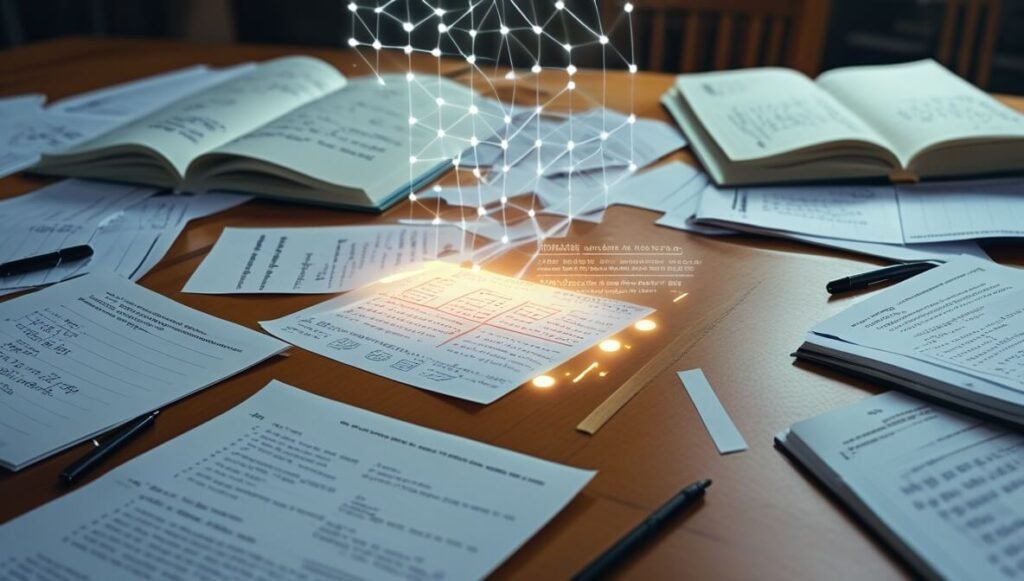
Okay, so what does this fancy AI cost?
Notion AI isn’t included in the standard free or paid Notion plans.
It’s an add-on.
Think of it like an upgrade.
You need a base Notion account first.
Notion has a free tier.
It’s pretty generous for individuals.
Allows unlimited blocks for individuals.
Limited block storage for teams on the free plan.
Then there are paid plans: Plus, Business, Enterprise.
These offer more features, collaboration options, admin tools, etc.
The AI add-on is a separate charge *per member*.
Currently, it’s priced at $10 per member per month.
Billed annually or monthly.
So, if you’re an individual using the free Notion plan, adding AI costs you $10/month.
If you’re on a team plan with 5 members, adding AI for everyone costs $50/month ($10 x 5).
Is there a free trial?
Yes, Notion usually offers a limited number of free AI responses when you first try it out.
This lets you test the waters.
See if it fits your workflow.
Check if the summaries are good for your needs.
Compare this to alternatives.
Most general-purpose AI writing tools like Jasper, Copy.ai, etc., have their own pricing structures.
They often work on word counts or credit systems.
And they aren’t integrated into your workspace like Notion AI is.
Other note-taking apps might offer limited AI features.
But Notion AI’s strength is that deep integration.
It works directly on the content within your notes and databases.
The $10/month price point is competitive for a dedicated AI assistant.
Especially considering the potential time savings.
For a student, maybe it replaces several hours of manual summary writing per month.
Is that worth $10? Probably.
For a professional or educator, the efficiency gains on research and content processing could easily justify the cost.
The cost needs to be weighed against the value it brings to *your specific* learning or work process.
Test the free responses.
See how much time you save.
Evaluate if the quality of the output meets your needs.
Then decide if the monthly fee makes sense for your budget and goals.
Hands-On Experience / Use Cases
Alright, enough theory.
What’s it actually *like* to use Notion AI for smart note taking?
Let’s run through a scenario.
Imagine you’re a student studying history.
You just finished a lecture on the Roman Empire.
You typed up rapid, slightly messy notes in Notion during the class.
Lots of bullet points, half-finished sentences, names, dates.
Maybe you pasted in a transcript from a recorded lecture.
First step: Clean up the notes.
Highlight a section of messy text.
Click the ‘Ask AI’ button that pops up.
Choose “Fix grammar and spelling” or “Improve writing.”
Instantly, your notes look more polished.
Easier to read later.
Next, you want a quick summary of the key events discussed.
Highlight the entire lecture notes block.
Click ‘Ask AI’.
Select “Summarize.”
Notion AI gives you a concise paragraph or bulleted list of the main points.
Attach this summary to the top of your notes page.
Now you have a quick reference point.
Ready for revision.
Maybe the lecture mentioned complex terms like “Pax Romana.”
You highlight “Pax Romana” in your notes.
Click ‘Ask AI’.
Choose “Explain this.”
Notion AI provides a brief explanation directly below.
You can turn this into a toggle block to keep your main notes clean but have explanations handy.
Time for an essay outline.
Create a new page linked to your Roman Empire notes.
Prompt Notion AI: “Using the notes on the Roman Empire lecture, create an outline for an essay discussing its decline.”
Notion AI generates a suggested structure.
Introduction, body paragraphs (maybe suggesting themes like economic factors, barbarian invasions, political instability), conclusion.
This gives you a starting point.
You can then flesh it out using your detailed notes.
Another case: You’re a researcher reading dozens of papers for a literature review.
Paste sections or even full PDFs (if you have the integration setup, or copy-paste text) into Notion pages.
Use AI to “Summarize this paper” or “Extract key findings on [specific topic].”
Quickly build up a database of paper summaries and relevant data points.
Use AI to “Find connections between these two papers” if you put their content side-by-side.
The usability is simple.
Highlight text, click the AI button, choose a command or type a custom prompt.
The results appear almost instantly.
You can insert them, replace the original text, or discard them.
The results are generally good for initial drafts, summaries, or brainstorming.
They usually need a quick human review and polish.
But the heavy lifting of reading, condensing, and structuring is significantly reduced.
It genuinely feels like an extension of your note-taking process.
Notion AI for Smart Note Taking makes the ‘smart’ part much more achievable for more people.
It’s about automating the tedious parts so you can focus on the thinking.
Who Should Use Notion AI?
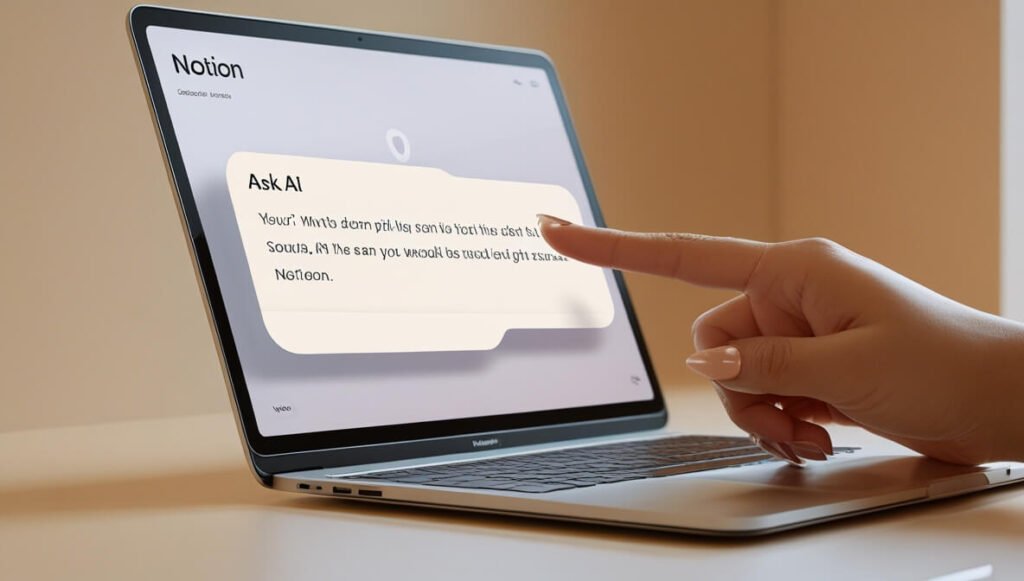
So, who is this actually for?
If you’re in learning and education, and you deal with information… that’s probably you.
Specifically:
Students: High school, college, grad school. Anyone taking classes, reading textbooks, writing papers. The summarization and explanation features are goldmines for studying. Essay outlining and brainstorming save serious time.
Educators: Teachers, professors, tutors. Managing curriculum notes, researching topics, preparing lectures, creating study materials. Notion AI can speed up resource processing and content generation for lessons.
Researchers: Academics, scientists, market researchers. Reading and summarizing research papers, extracting key data, organizing literature reviews. Notion AI is a powerful tool for managing research information.
Online Course Creators: Developing course content, structuring modules, writing scripts for videos or lectures based on research. AI can help outline, summarize source material, and even draft sections.
Corporate Trainers: Preparing training materials, summarizing complex manuals, creating learning objectives from content. Notion AI can make this process more efficient.
Lifelong Learners: Anyone constantly learning new skills or topics from online courses, books, or articles. If you use Notion to organize your learning resources, AI makes processing that information much faster.
Basically, if your workflow involves:
- Reading lots of text.
- Taking notes on that text.
- Needing to summarize or find key points later.
- Structuring information for essays, reports, or presentations.
- Trying to understand complex topics.
- Working within Notion already.
Then Notion AI is likely a good fit.
It’s particularly powerful if you’re already committed to the Notion ecosystem.
Adding AI on top leverages the data you already have within your workspace.
It’s less useful if you just need a standalone AI writer for simple tasks.
Its strength is its integration with your organized knowledge base.
Consider your daily tasks.
How much time do you spend reading and summarizing?
How much time do you spend trying to find information in old notes?
How often do you struggle to start writing based on your research?
If these are significant pain points, Notion AI for Smart Note Taking could be the solution.
It’s for people who see their notes not just as storage, but as a dynamic tool for learning and creating.
How to Make Money Using Notion AI
Okay, the money question.
Can you actually earn cash using Notion AI?
Yes, indirectly or by offering specific services.
It’s not a direct money printer, but a tool to make you more efficient and capable.
Here’s how:
- Offer Summarization and Note-Taking Services:
Students, researchers, professionals often need help processing information.
You can offer services to take raw materials (lectures, papers, meetings) and turn them into organized, summarized notes using Notion AI.
Charge per hour or per project.
Your speed with Notion AI gives you an edge.
Think transcription services, but adding a layer of smart summarization and organization.
- Create and Sell Premium Study Guides or Course Materials:
Use Notion AI to rapidly process source material for specific subjects.
Create highly summarized, well-organized study guides.
Or develop detailed course outlines and content structures.
Package these up as digital products.
Sell them on platforms like Gumroad, Etsy, or your own website.
Notion AI helps you build these products much faster than manual methods.
- Provide Notion Workspace Setup and Optimization for Education Clients:
Many educators and students struggle to set up effective digital workspaces.
You can offer consulting services.
Set up Notion dashboards specifically for academic research, course management, or student note-taking systems.
Show clients how to integrate Notion AI into *their* workflow.
Explain how to use AI prompts for summarizing lectures or outlining essays.
Charge for your expertise and setup time.
- Write and Sell Summaries of Popular Books or Articles:
Identify popular non-fiction books, research papers, or online articles relevant to learning and education.
Use Notion AI to quickly generate high-quality summaries.
Review, edit, and refine them.
Bundle these summaries and sell access.
Platforms exist for selling book summaries.
Your efficiency with AI lets you produce more summaries faster.
- Boost Your Own Productivity to Take on More Clients/Projects:
If you’re a freelance tutor, academic writer, or educational content creator, time is money.
Notion AI makes you faster at research, outlining, drafting, and editing.
This means you can handle more clients or complete projects quicker.
Charge the same rate, do more work, earn more money.
Or charge a premium because you deliver faster results.
Efficiency directly translates to increased earning potential in service-based roles.
Think of Notion AI as a force multiplier.
It doesn’t do the work *for* you entirely, but it makes *your* work significantly more efficient.
Especially around text processing and organization related to learning and education content.
The more efficient you are, the more valuable you become.
That value can be captured by offering faster services or creating more products in less time.
It’s about leveraging the tool to enhance your own output and offerings in the market.
Limitations and Considerations
It’s not all sunshine and rainbows.
No tool is perfect.
Notion AI has limitations you need to be aware of.
Accuracy & Quality: AI generates text based on patterns.
It can sometimes misunderstand context.
Produce factually incorrect information.
Or generate text that sounds a bit generic or “AI-like.”
Crucially, you MUST review and edit the output.
Especially in learning and education, where accuracy is paramount.
Don’t blindly copy-paste AI summaries into your research papers.
Always verify information generated by the AI.
Need for Clear Prompts: Notion AI works best with clear, specific instructions.
“Summarize this” is okay, but “Summarize this lecture transcript focusing on the key economic factors discussed, in bullet points” is better.
Learning how to write effective prompts takes practice.
Poor prompts lead to poor results.
Context Limitations: While Notion AI is integrated, it has limits on how much context it can process at once.
Feeding it a massive, multi-page document might yield less precise results than feeding it smaller, focused sections.
It primarily works on the text blocks you select or the page you’re on.
It doesn’t inherently understand the relationships between dozens of pages in your workspace without explicit instruction.
Notion Dependency: It only works within Notion.
If your primary workflow is outside of Notion, the AI feature won’t help you there.
You need to be using Notion as your central hub for notes and documents to get the most value.
Cost: As discussed, it’s an additional $10/month per user.
For an individual student on a tight budget, this might be a consideration.
For teams, the cost adds up.
Evaluate if the time savings justify the recurring expense.
Learning Curve (Minor): While the interface is simple, understanding the best ways to use the different AI features and crafting effective prompts takes a little bit of a learning curve.
It’s not steep, but it’s not zero either.
You need to spend a little time experimenting.
These aren’t reasons to avoid Notion AI entirely.
But they are important to keep in mind.
Treat the AI output as a starting point, not the final product.
Understand its strengths and weaknesses for your specific note-taking needs.
And be realistic about what it can and cannot do.
It’s a powerful assistant, not a magic bullet that replaces critical thinking or careful review.
Final Thoughts
So, wrapping this up.
Notion AI is a serious addition to the learning and education toolkit, especially for smart note taking.
It takes the already flexible Notion workspace and injects it with intelligence.
The ability to summarize, extract key points, explain concepts, and help with drafting right inside your notes is genuinely impactful.
It cuts down on the drudgery of information processing.
Frees up your time.
Helps you engage with material more actively.
And makes your notes significantly more useful and searchable.
For students drowning in lectures and readings, it’s a lifeline.
For educators and researchers managing vast amounts of information, it’s an efficiency machine.
Yes, it costs extra.
Yes, the output needs review.
But the potential return on investment in terms of time saved and improved learning/working outcomes is significant.
If you’re serious about making your notes work harder for you.
If you’re already using Notion or considering it as a central workspace.
Notion AI is absolutely worth testing out.
Use the free responses to see if it clicks with your workflow.
See how much faster you can process information.
See if it makes tackling complex subjects less daunting.
It’s not just another AI tool.
It’s an AI tool integrated into the place where your knowledge lives.
That makes all the difference.
It could genuinely change how you approach studying, researching, and managing information.
Ready to see it in action?
Visit the official Notion AI website
Frequently Asked Questions
1. What is Notion AI used for?
Notion AI is an AI feature built into Notion that helps you work with text.
It can summarize documents, brainstorm ideas, write drafts, find action items in notes, improve writing, translate, and explain complex concepts.
It’s primarily used to boost productivity and streamline workflows related to text and information management within your Notion workspace.
2. Is Notion AI free?
No, Notion AI is a paid add-on feature.
You need a Notion account (which has a free plan), but the AI capabilities cost extra.
It’s currently priced at $10 per user per month, billed annually or monthly.
They usually offer a limited number of free responses when you first try it.
3. How does Notion AI compare to other AI tools?
Notion AI’s main advantage is its deep integration into the Notion workspace.
It works directly on your notes, documents, and database entries.
Other general AI writing tools are often standalone or require copy-pasting content.
Notion AI is tailored for tasks within a knowledge management system.
4. Can beginners use Notion AI?
Yes, the interface is designed to be user-friendly.
You just highlight text and click a button.
While crafting the *best* prompts takes a little learning, the basic functions like summarizing or fixing grammar are very easy to use even if you’re new to AI.
5. Does the content created by Notion AI meet quality and optimization standards?
AI-generated content is a starting point.
It can be high quality for drafting or summarization.
However, it always requires human review, editing, and fact-checking to ensure accuracy and meet specific quality or optimization standards for things like publishing or academic work.
It’s a tool to assist, not replace, human effort.
6. Can I make money with Notion AI?
Yes, indirectly.
You can use Notion AI to increase your efficiency in services like note-taking, summarization, or content creation, allowing you to take on more work or charge more for speed.
You can also use it to rapidly create assets like study guides or summaries to sell as digital products.
It’s a productivity booster that can enhance your earning potential.



